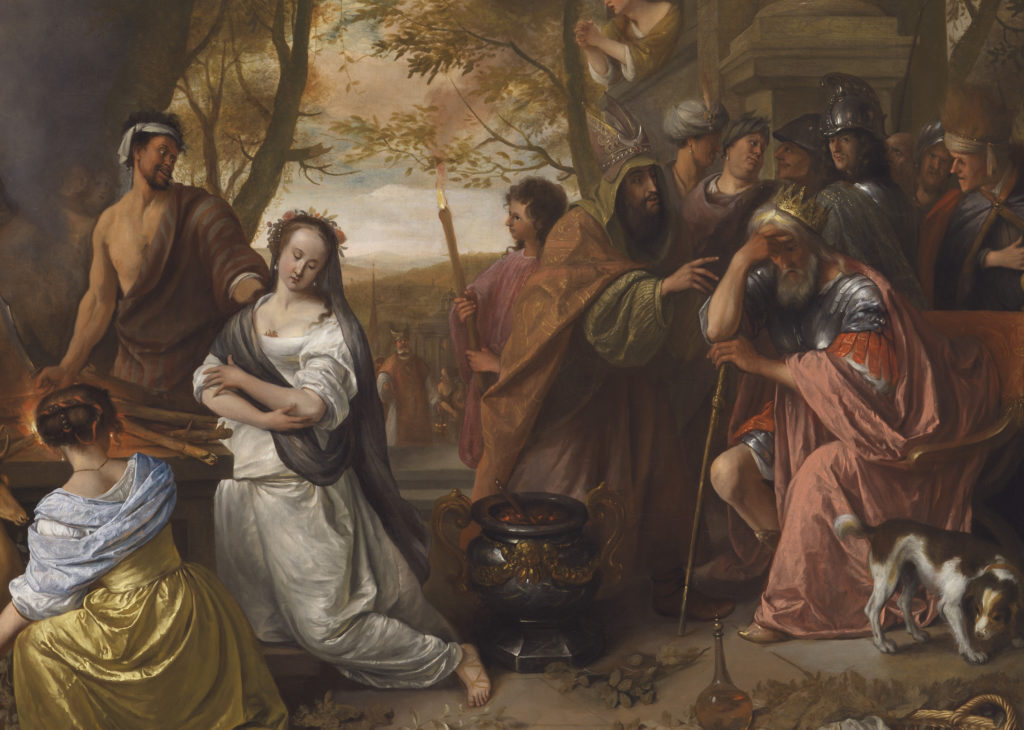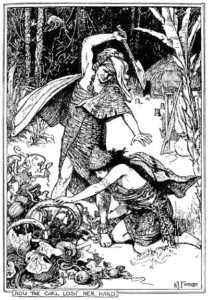
In a recent New Yorker article about White House press secretary Sarah Huckabee Sanders, I came across the following description of a meeting she had that included her father, Mike Huckabee, and then-candidate Donald Trump.
“There (at the Atlanta airport) they boarded Trump’s private jet. . . .When Trump asked Huckabee for an endorsement, Huckabee instead suggested that he (Trump) enlist his daughter. Trump needed a stronger link to evangelicals and women, and Sanders was happy to provide one.”
The operative word in the above quote is “happy.” Ms. Sanders was consensual, if not enthusiastic, about working for Mr. Trump. A darker, more sinister version of this enactment, a daughter offered up by a father for personal gain, appeasement, or out of ignorance is a recurrent narrative thread in myths and fairy tales and underlines the role of the sacrificial daughter.
 In the Brothers Grimm’s version of “The Girl without Hands,” a poor miller in need of money inadvertently makes a pact with the devil who “will come in three years to claim that which stands behind the mill.” That turns out to be, not the apple tree the miller thought, but his daughter who was sweeping the yard at the time.
In the Brothers Grimm’s version of “The Girl without Hands,” a poor miller in need of money inadvertently makes a pact with the devil who “will come in three years to claim that which stands behind the mill.” That turns out to be, not the apple tree the miller thought, but his daughter who was sweeping the yard at the time.
The miller’s daughter was a beautiful and pious girl, and she lived the three years worshipping God and without sin. When the time was up and the day came when the evil one was to get her, she washed herself clean and drew a circle around herself with chalk. The devil appeared very early in the morning, but he could not approach her.
He spoke angrily to the miller, “Keep water away from her, so she cannot wash herself any more. Otherwise I have no power over her.”
The miller was frightened and did what he was told. The next morning the devil returned, but she had wept into her hands, and they were entirely clean. Thus he still could not approach her, and he spoke angrily to the miller, “Chop off her hands. Otherwise I cannot get to her.”
The miller was horrified and answered, “How could I chop off my own child’s hands!”
Then the evil one threatened him, saying, “If you do not do it, then you will be mine, and I will take you yourself.” This frightened the father, and he promised to obey him. Then he went to the girl and said, “My child, if I do not chop off both of your hands, then the devil will take me away, and in my fear I have promised him to do this. Help me in my need, and forgive me of the evil that I am going to do to you.” She answered, “Dear father, do with me what you will. I am your child,” and with that she stretched forth both hands and let her father chop them off.
Eventually, after a journey and travails, and because she is pious and good, the miller’s daughter marries a king and her hands are restored.
 Another tale in which a poor miller father sells his daughter to gain stature and wealth is the story of “Rumpelstiltskin.” Here the father brags to the king that his daughter can spin straw into gold. She is brought to the king, locked into a room and given the command, her life in jeopardy if she fails to succeed at this impossible task. Narcissism, greed, and domination in the figures of father and king are allied against her. With the help of the magical imp Rumpelstiltskin, the daughter succeeds in her task, but in exchange must give him her firstborn child. She is finally able to claim her child and her independence only after she guesses the name of her tormentor, “Rumpelstiltskin.” Psychologically, this rings true: until we name the negative force that has hold of us, we remain within its power.
Another tale in which a poor miller father sells his daughter to gain stature and wealth is the story of “Rumpelstiltskin.” Here the father brags to the king that his daughter can spin straw into gold. She is brought to the king, locked into a room and given the command, her life in jeopardy if she fails to succeed at this impossible task. Narcissism, greed, and domination in the figures of father and king are allied against her. With the help of the magical imp Rumpelstiltskin, the daughter succeeds in her task, but in exchange must give him her firstborn child. She is finally able to claim her child and her independence only after she guesses the name of her tormentor, “Rumpelstiltskin.” Psychologically, this rings true: until we name the negative force that has hold of us, we remain within its power.
The unnamed daughter of Jephthah in the Bible is not so lucky to be saved (Judges 11:30-40). Her father makes a vow with God:
11:30 And Jephthah made the following vow to Yhwh: “If You deliver the Ammonites into my hands, 11:31 then whatever comes out of the door of my house to meet me on my safe return from the Ammonites shall be Yhwh’s and shall be offered by me as a burnt offering.
 Unfortunately, it is Jephthah’s daughter who dances out of his house to greet him. She accepts her sacrificial fate, but asks her father for two months in the mountains with her women to celebrate her virginity. This is granted. Nonetheless, she is consecrated as an offering to the Lord. She is able to tell herself she is not a victim without choice. Unlike the miller in “The Girl without Hands,” Jephthah is motivated by ambition, not necessity. He is a warrior and a leader, and his success against the Ammonites will make him the rosh or head of Gilead.
Unfortunately, it is Jephthah’s daughter who dances out of his house to greet him. She accepts her sacrificial fate, but asks her father for two months in the mountains with her women to celebrate her virginity. This is granted. Nonetheless, she is consecrated as an offering to the Lord. She is able to tell herself she is not a victim without choice. Unlike the miller in “The Girl without Hands,” Jephthah is motivated by ambition, not necessity. He is a warrior and a leader, and his success against the Ammonites will make him the rosh or head of Gilead.
 Yet another story concerning the sacrifice of a daughter for the ambitions of a warrior-hero-father is the Greek myth of Iphigenia. King Agamemnon, Iphigenia’s father, is about to wage war on Troy. However, Agamemnon has insulted the goddess Artemis, who in retaliation has becalmed the seas so that his fleet cannot set sail. To appease Artemis, Agamemnon must sacrifice his eldest daughter, Iphigenia. For the glory of Greece, Iphigenia goes willingly to her death.
Yet another story concerning the sacrifice of a daughter for the ambitions of a warrior-hero-father is the Greek myth of Iphigenia. King Agamemnon, Iphigenia’s father, is about to wage war on Troy. However, Agamemnon has insulted the goddess Artemis, who in retaliation has becalmed the seas so that his fleet cannot set sail. To appease Artemis, Agamemnon must sacrifice his eldest daughter, Iphigenia. For the glory of Greece, Iphigenia goes willingly to her death.
Fairy tales and myths, as Carl Jung suggested, reveal archetypal motifs that offer insight into our human wishes, fantasies, fears and desires. Whether we identify with Cinderella’s lonely plight, or the frog prince’s yearning to be his fully human self, at the deepest level of fairy tale content, we experience an “Aha!” phenomena. Jack Zipes, in the preface to the 1979 edition of Breaking the Magic Spell, Radical Theories of Folk and Fairy Tales, writes:
“From birth to death we hear and imbibe the lore of folk and fairy tales and sense that they can help us reach our destiny. They know and tell us that we want to become kings and queens, ontologically speaking to become masters of our own realms….They ferret out deep-rooted wishes, needs, and wants and demonstrate how they all can be realized.”
Jung saw fairy tales as depicting patterns of development and behavior that reflect the function of the psyche, and even today we can find new wisdom about our human predicaments in the old tales.
With this in mind, how do we think about the tales of sacrificial daughters? What does it mean that in most fairy tales, a jealous or evil king may send his son on a dangerous journey or give him an impossible task to fulfill, but rarely is the son held captive, enslaved, mutilated, or murdered? Might sacrificial daughters represent a collective cultural phenomena of the devalued feminine?
One pattern that emerges in several of these stories is that of the absent, passive, or duped mother. This is the mother who won’t or can’t protect her victimized daughter. Her loyalty often remains with the father, and she will not disobey the ruling masculine hierarchy. (In keeping with Greek themes of inherited or familial revenge, Clytemnestra, Agamemnon’s wife, does in some version of the story kill her husband for his murder of their daughter.)
The absent, compliant, or complicit mother unwillingly abets the father in treating females as objects by colluding with and succumbing to the spell of his power. Without a positive mother figure in her life, the daughter has nothing of substance from the personal mother or from the world of the feminine. For this daughter, the adored or charismatic father can take on the qualities of a god. Both Jephthah’s daughter and Iphigenia do not resist their fate, but in some sense become martyrs to their father’s cause as in the gruesome example of the miller’s daughter who deferentially accepts the dismemberment of her hands. To be without hands means to be helpless in the world, to be unable to perform ordinary human tasks. Here, the daughter forgoes a part of her humanness to accommodate the father. “Do with me what you will, father,” she says. “For I am your child.”
 To identify with the dominant ruling culture is often a way women cope with subjugation and abuse. In her ground-breaking book Toward a New Psychology of Women (1976), decades old but ever more relevant in today’s #MeToo world, Dr. Jean Baker Miller examines women’s difficulties in claiming their “full personhood” and in valuing themselves and their strengths, which are viewed as inferior by the dominant culture.
To identify with the dominant ruling culture is often a way women cope with subjugation and abuse. In her ground-breaking book Toward a New Psychology of Women (1976), decades old but ever more relevant in today’s #MeToo world, Dr. Jean Baker Miller examines women’s difficulties in claiming their “full personhood” and in valuing themselves and their strengths, which are viewed as inferior by the dominant culture.
“A dominant group,” Miller writes, “inevitably, has the greatest influence in determining a culture’s overall outlook—its philosophy, morality, social theory, and even its science. The dominant group, thus, legitimizes the unequal relationship and incorporates it into society’s guiding concepts.” Not just women, but all marginalized groups share this experience since the dominant group is the model for what is considered normal.
Conversely, writes Miller, “a subordinate group has to concentrate on basic survival. Accordingly, direct, honest reaction to destructive treatment is avoided. Open, self-initiated action in its own self-interest must also be avoided…. In our own society, a woman’s direct action can result in a combination of economic hardship, social ostracism, and psychological isolation.”
If we take a quick glance around the globe, we can see that subordinate populations on every continent, and women in general, are subjected to less than equal treatment.
In the stories mentioned above, each daughter acquiesces to the demands of the father, the dominant power figure, and by identifying with him and his goals, deludes herself into believing that his perpetration is a noble act. Her self-worth depends on his status. Historically, women have been “unable to see much value or importance in themselves or each other, when women were focused on men as the important people.”
Miller goes on to say, “There are still few women who can believe deeply that they are truly worthy.” What has been continues to be: women struggle against being cast in the inferior role in society. In reexamining fairy tales we consider how they continue to reflect conscious and unconscious attitudes in a culture. If popular culture, particularly children’s movies and books, has shifted its focus from the sacrificial daughter, what images have replaced it? While vibrant images of sharp-shooting, dragon-slaying heroines occasionally fill our screens, the emergence of the #MeToo and other movements for equal rights and justice suggest post-modern Disney heroines are not enough; unconscious prejudices require our personal and deepest attention and consideration to be confronted, made visible and redeemed. Unfortunately, for now, the prejudices, injustices, and issues of worth that revolve around power, domination, and subordination persist.
This post appeared in a slightly different form on Dale’s blog on Psychology Today. You can find all of Dale’s blog posts for Psychology Today at